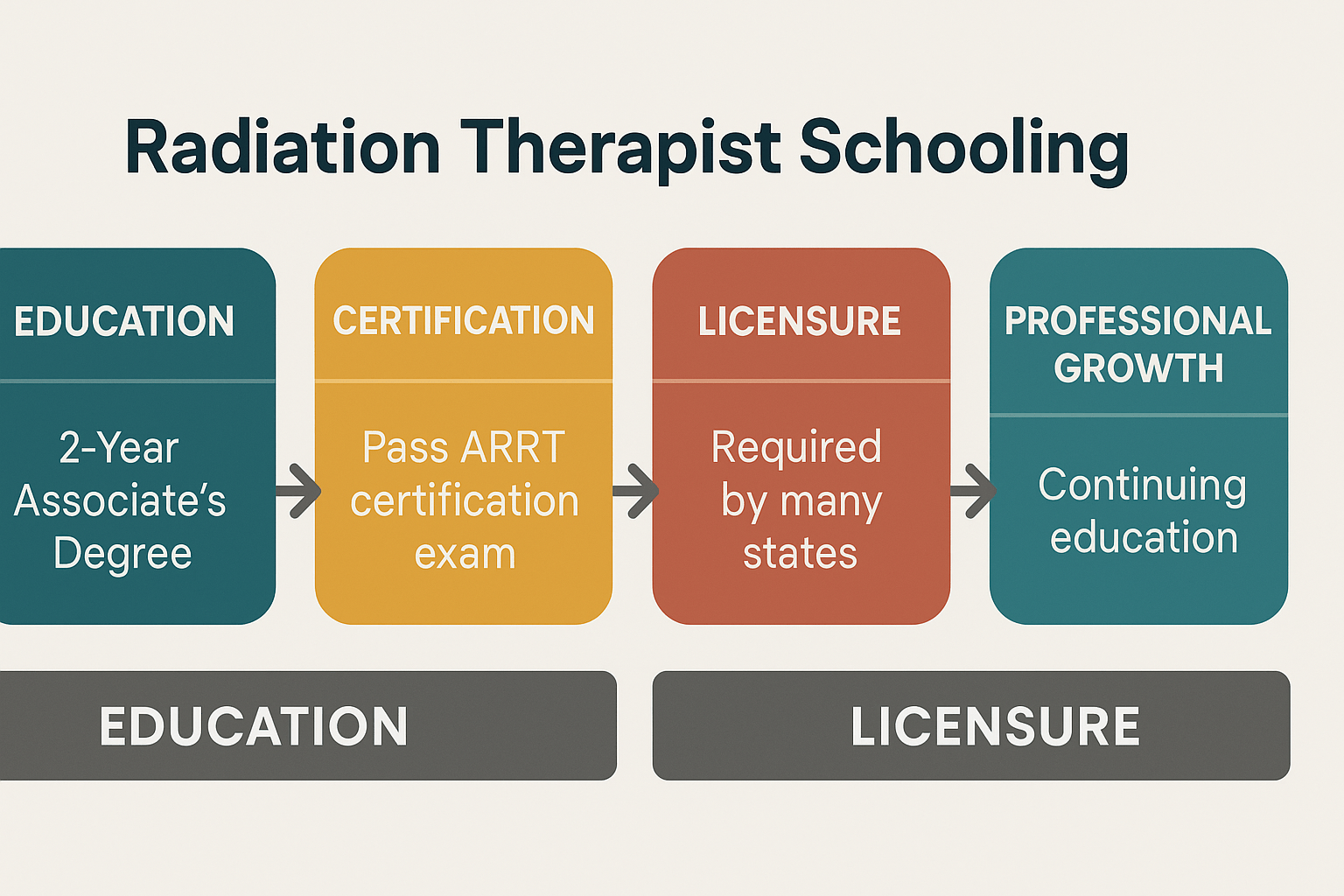Radiation Therapist Schooling refers to the complete academic and clinical pathway students must follow to enter this highly specialized medical field. A radiation therapist is not just a machine operator; they are professionals who work side by side with oncologists to deliver targeted radiation therapy to cancer patients. Because the margin for error is so small, the schooling process is both rigorous and rewarding.
This journey blends science, hands-on training, patient care, and certification. For anyone who loves precision, healthcare, and making a real impact on people’s lives, radiation therapy offers an exciting career path.
Educational Requirements: From High School to Degree
The first step starts with a high school diploma or equivalent. Strong backgrounds in biology, physics, chemistry, and math are crucial because these subjects form the backbone of radiation therapy. Students who excel in these courses often find the transition into medical schooling smoother.
After high school, future therapists typically choose one of two routes:
-
An associate’s degree in radiation therapy or radiologic sciences.
-
A bachelor’s degree in radiation therapy, which usually provides more opportunities for fadvancement.
Radiation Therapist Schooling programs mix classroom learning—covering anatomy, radiation physics, and treatment planning—with clinical practicums in hospitals and cancer centers. These practicums allow students to work under supervision, positioning patients, operating equipment, and learning to handle the emotional side of oncology care.
Related Article: Food to Avoid During Radiation Therapy
Certification and Licensing
Completing Radiation Therapist Schooling is just the beginning. Most states and employers require certification. In the U.S., that means passing the exam offered by the American Registry of Radiologic Technologists (ARRT). Once certified, therapists may also need a state license depending on where they work.
Licensing ensures that every radiation therapist not only understands the theory but can apply it in practice. It’s a system designed to protect both patients and professionals, and it keeps the field’s standards consistently high.
Skills You’ll Develop Along the Way
Radiation Therapist Schooling teaches more than technical knowledge. Students also build a set of soft skills that are just as vital:
-
Compassion and communication: Cancer patients often arrive scared or exhausted; therapists must explain treatments clearly and provide emotional support.
-
Attention to detail: Radiation must be delivered within millimeters of accuracy, leaving no room for carelessness.
-
Technical adaptability: With machines constantly evolving, therapists need to stay updated and comfortable with new systems.
-
Critical thinking: Each patient is unique; therapists learn to make quick, safe adjustments when situations change.
Timeline and Duration
The length of Radiation Therapist Schooling depends on the chosen degree. An associate’s program takes about two years, while a bachelor’s degree usually requires four years. Some certificate programs exist for students who already hold a degree in a related field, often lasting about 12–18 months.
Add in the certification and licensing process, and most therapists are ready to enter the workforce within three to five years of starting their education.

Career Outlook and Salary
The career outlook for radiation therapists is steady. As cancer treatments evolve and more patients require radiation therapy, the demand for trained professionals continues. According to labor statistics, job growth is modest but reliable.
Salaries vary widely depending on location, experience, and setting, but radiation therapists are generally well compensated compared to many other healthcare roles. Those with bachelor’s degrees, certifications, and additional specialties may earn higher wages or qualify for leadership roles.
Challenges During and After Schooling
It’s worth noting that the road isn’t easy. Radiation Therapist Schooling is demanding, both mentally and emotionally. Students often report that balancing coursework, clinical hours, and personal life is tough. Later in their careers, therapists may experience the emotional burden of working daily with cancer patients.
Yet, many professionals describe the rewards as outweighing the challenges. Knowing you play a direct role in a patient’s fight against cancer can be incredibly fulfilling.
Is This the Right Path for You?
If you enjoy science, thrive on precision, and want a career where you can directly help people, then Radiation Therapist Schooling may be the right path. It’s a field that offers stability, respect, and daily opportunities to make a difference.
For updated details on accredited programs and certification requirements, you can visit the official American Registry of Radiologic Technologists website.
In conclusion, Radiation Therapist Schooling is a challenging but rewarding journey. From science-heavy coursework to clinical rotations, from certification exams to lifelong learning, every step prepares you for a role that directly touches patients’ lives. By completing this path, you don’t just build a career—you become part of a team that helps people battle one of life’s toughest diseases.
